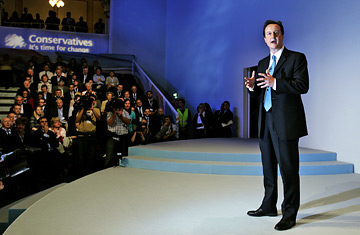
David Cameron, leader of Britain's Conservative Party, on stage at its conference
Like drunks in a rough pub on a Saturday night, Britain's political leaders look to be itching to start a brawl. British political life is always fractious at this time of year — it's when the major parties hold their conventions in rapid sequence — but this fall the insults are flying faster and nastier than usual. The atmosphere is febrile. Politicians of all stripes believe there's a good chance that Gordon Brown, 56, who in June took over as Prime Minister from Tony Blair without a fresh mandate from British voters, will early next week call a snap poll on November 1 to add legitimacy to his reign and to secure a fresh five-year term in government. During a sudden visit to Iraq on Oct. 2, he announced plans to cut the number of British troops stationed there from 5500 to 4500 by Christmas. The Tories attacked this move as a cynical piece of electioneering, but on Monday the Prime Minister is expected to signal a further drawing down of British forces. Ahead in the polls and boosted by a Labour conference last week that was free from the internal bickering that blighted most of Blair's last years in office, Brown appeared to have nothing to lose by triggering an election and much to gain — not least the chance to face voters before tricky economic conditions serve up any more unpleasant surprises like the recent panic over the financial stability of Northern Rock, one of Britain's largest mortgage lenders.
Or so it seemed until David Cameron on Oct. 3 capped an unexpectedly successful Tory party conference by delivering an hour-long speech that won over doubters in his own party and, Tories now dare to dream, blew any potential electoral contest wide open. "Everyone who came here feared a general election," says Iain Dale, an influential Conservative blogger and commentator. "Now they're relishing one."
That, as British bookmakers say when a racing outsider romps home to victory, would be a turn up for the books. Before they convened in the northern seaside resort town of Blackpool, the Conservatives who under Thatcher knew nothing but success, appeared to be in a hopeless shambles. The party has been out of power since Blair's overwhelming victory in 1997; Cameron is their fourth leader since that rout. He has unsettled traditional Tories with his determination to make the party greener and more humane, and his rejection of social conservatism. His easy manner and impressive oratory skills draws comparisons to Blair. These comparisons once sounded flattering but later, as Blair lost popularity, mutated into taunts; even some members of his own party dismissed Cameron as a bantamweight Blair who would be hopelessly outclassed by the heavyweight Brown. Just before the Tory conference kicked off, Lord Tebbitt, a Cabinet minister in Margaret Thatcher's government, remarked, dismissively, that Cameron had "no experience of the world."
"Are you tough enough?" It's a question Cameron acknowledged his own party and his opponents were asking. In his virtuoso conference speech, Cameron affirmed that he was and, like a barroom fighter, invited Brown to bring it on. "So Mr. Brown, what's it going to be?" he said. "Why don't you go ahead and call that election?"
If Brown accepts that challenge, he may well find his opponents harder to beat than many in his own ranks had anticipated. In Blackpool, Tory leaders set out policies reaffirming the party's traditional role as a party of low tax and high aspiration, including a boost for first-time house-buyers and an increase in the threshold of inheritance tax to $2 million from $600,000, financed by levying a flat-rate annual $50,000 charge on non-domiciled foreigners. Delegates were delighted. "People kept coming up to me and saying 'finally we're Conservative again'," says Dale.
Despite Cameron's apparent readiness to fight, some leading Tories privately acknowledge they are hoping Brown will decide against a November poll after all. They want more time to organize and to woo the electorate, and also believe voters will become disenchanted with Brown. "The success of this conference doesn't mean victory for the Conservatives is probable," admits Dale. "But sometimes things move." This weekend, political leaders will be studying the latest opinion polls closely to see what movement the last few days have generated. Brown's decision on whether to call an election hangs on that analysis.
